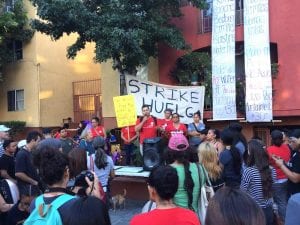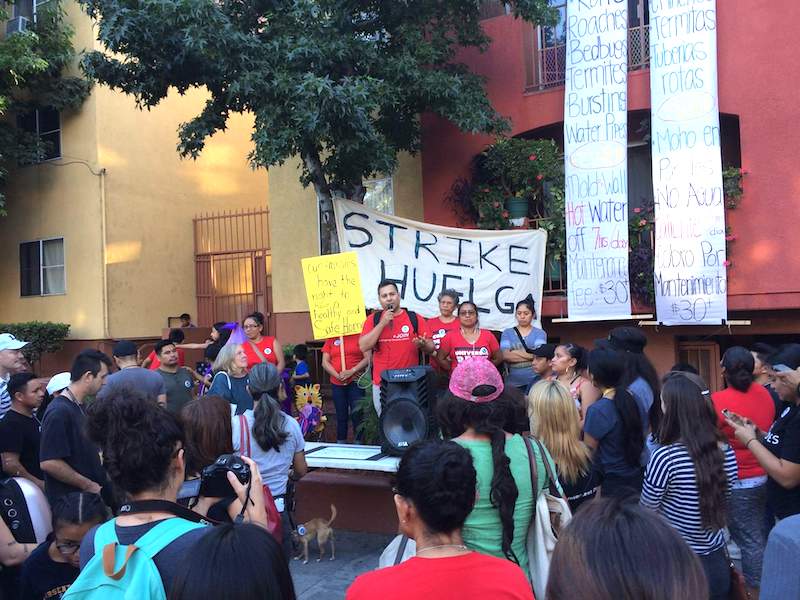
Members of VyBe, a local chapter of L.A. Tenants Union, speaking at a rally outside of Burlington apartments.
In South Africa there’s a growing movement demanding land expropriation without compensation to address the hundreds of years of colonial exploitation and dispossession that Black South Africans suffered at the hands of white European settlers.
Most people who know even a bit about the region’s history would conclude that this is entirely reasonable, the justification for such a program coming from the understanding that the gross injustices of the past live on in the present, and should be rectified.
I’d like to apply this framing to contemporary struggles over land in Los Angeles, and to the situation at Burlington—a group of apartment complexes in the neighborhood of Westlake—in particular.
Let’s imagine a city government that really cared for tenants, and was willing to directly challenge status quo arrangements and create alternative systems in which the people and communities that actually live on a given plot of land have power over how it’s used. And let’s consider how this might look in light of historical wrongs like slavery, redlining, segregation, genocide of Native Americans, and Euro- and U.S-led colonialism all across the world, whose legacies still play massive roles in shaping life in 2018.
Finally, let’s think about how reparations and land expropriation are not just reasonable, but absolutely necessary, solutions justified here too. (Reparations, throughout the U.S. more broadly, are a core demand of The Movement for Black Lives.)
We can start by taking land owned by white slumlords.
Although the Burlington apartments owners recently dismissed the remaining eviction filings of the 200-plus rent-striking tenants, the fight is far from over at these properties, which an attorney named Lisa Ehrlich inherited from her father in the gentrifying neighborhood of Westlake. (I’ve been told by the Burlington tenants’ attorney, Elena Popp, not to call her a slumlord—the properties are technically owned by her family’s investment trust, a corporate entity, meaning Ehrlich herself isn’t technically the landlord. So I won’t say that she is a slumlord.)
Still, under no reasonable conception of justice should Ehrlich be allowed to own or manage rental property.
Her record, from Burlington, to Palm Springs, to Fresno, demonstrates that she is not the slightest bit concerned with the well being of the people that live on her property. In order to maximize profit, she allows her buildings to deteriorate to the point of causing serious harm to her tenants. Six separate juries have ruled that she failed to provide habitable units at Burlington, with many of the rulings mandating substantial rent decreases to tenants. The rest of the cases were recently dropped because Ehrlich realized that future juries would likely rule in the same way.
Though there must exist a threshold at which a landlord loses their “right” to own rental property, the Housing and Community Investment Department of Los Angeles (HCIDLA), the city agency responsible for enforcing the law against landlords who fail to provide habitable units, has been useless. The tenants at Burlington have been reporting violations for months, to no avail.
If Los Angeles had functioning city, county, or state agencies that truly pursued justice and equity, they would seize her land and give it to the Burlington tenants to own and operate collectively, and give her nothing in return.
The facts that the Ehrlich family has very likely already made substantial profits on the buildings—they were bought for $8.42 million in 1994, total property taxes in 2016 were just over $100,000, and 192 tenants collectively pay about $2 million in rents per year— and that Ehrlich inherited them from her father aren’t even necessary to justify this. Only a decent understanding of the past is.
There are tons of different histories, beyond the original conquest and mass murder of indigenous communities by white settlers before California was even a state, that would justify such reparations.
Here’s just a taste from the post-WWII era: only 3 percent of all housing units in LA constructed in the 1950s boom were able to be purchased by non-whites, according to Mike Davis in the book City of Quartz, meaning an entire generation of people of color were barred from the opportunity to build wealth through homeownership. Restrictive covenants, racist real estate practices, and groups like the “Culver City for Caucasians Committee” were very influential in structuring who could access land. Meanwhile, during roughly the same period, tens of thousands of people, disproportionately Latinx and Black, were displaced by freeway construction and urban renewal projects in Downtown LA, East LA, and South LA. In so many different ways, the ability to own property was based on one’s race.
Given that the majority of Burlington tenants are immigrants from Mexico or Central America, we should also keep in mind the hundreds of years of violent and extractive colonialism waged by white Europeans against the populations of these regions, in addition to the more recent imperial destabilization campaigns by the U.S. that have helped to feed the immigration crisis.
It’s not just by chance that today in Los Angeles, on average, Black and Mexican households have one cent for every dollar of wealth held by the average white household.
Though Ehrlich is not directly to blame for these historical realities, she profits from them (and is indeed a bad steward of the properties she owns). Seizing her property and giving it to the tenants would produce a more just and equitable outcome than the status quo practiced in the past.
South Africa again provides a useful comparison. Land reform has been on the agenda since Nelson Mandela’s African National Congress took power in the mid-1990s, but only a tiny fraction of land has been redistributed since then. And lots of the land previously owned by the settlers themselves has been sold off—often to multinational corporations that didn’t directly contribute to this particular history of oppression. But most people still look at the situation and conclude that expropriation without compensation is justified, including the conservative Prime Minister of the U.K., Theresa May.
I think this is something to understand about reparations on a more general, larger scale—that there’s no way to make it absolutely perfect, but justice demands that it be done in some manner nonetheless.
Just one proposal: start with the slumlords.






May I suggest that a better standard to bring about control by those victimized by slumlords is that expropriation be considered for owners who do not live in the census track in question and have allowed more than 1 serious violation per apartment to have occurred in a multiple dwelling during the course of the previous 12 months. Race is only part of the equation. Another consideration would be to transfer ownership through a rent receiver action where the deed is eventually transferred to a local community development trust.
What about the constitutional requirement that you can’t take life liberty or property without due process
We could create a legal process for this that grants slumlords due process. The issue, I think, is the “without compensation” part, which might not be constitutional.